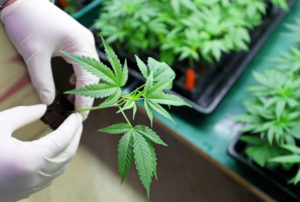
More than likely, you already know MMJ as a familiar acronym for medical marijuana. In New Jersey, the Department of Health oversees the state’s MMJ program. First, a doctor must certify that a patient has a qualifying condition that cannabis can help. (Recent reforms added medical conditions to those that existed since the law first went into effect.)
After the physician signs off on the patient’s needs, the individual applies for a medical marijuana card. Subsequently, medical cannabis can only be obtained from one of New Jersey’s five dispensaries (also known as alternative treatment centers) located in Bellmawr, Cranbury, Egg Harbor, Montclair, and Woodbridge.
Although most say it’s unlikely, dispensary owners could be at risk when it comes to legal prosecution. Cannabis remains illegal on a federal level. In fact, it’s the reason that cash is the only method of payment in all of the alternative treatment centers. Many banks are concerned with the impact of federal prohibition laws.
Meanwhile, just because an individual has a medical marijuana card in New Jersey or some other state, doesn’t mean they can’t get in legal trouble. What follows is the first in a series of real-life examples where MMJ cardholders may need the experience of an attorney familiar with DUI laws and criminal defense.
Charged with DUI after Using Medical Cannabis
Joe Constantine considers medical cannabis a lifesaver. Although Joe readily concedes that he smoked pot decades ago, he gave up when he became a father. However, after Joe was diagnosed with MS, the doctor suggested that medical marijuana would help him.
Although Joe knew that doctors were prescribing marijuana for his condition, he wasn’t sure it would work. Nonetheless, he paid the fees to get his card. Admittedly, Joe was shocked when he saw the prices to purchase legal weed from the dispensary.
It turned out the MMJ really did help Joe with his muscle stiffness and spasms. In fact, it brought him a great deal of relief. However, certain cannabis strains made Joe feel a bit high. Therefore, he was extra careful not to get behind the wheel when he felt even slightly under the influence.
Fast forward a bit. When Joe is involved in an automobile accident, the police suspect that he is drunk, partially based on the smell of alcohol on his breath. Ultimately, Joe agrees to give blood and urine samples as requested by the police officer.
When the results come back, Joe’s blood alcohol content (BAC) is below the legal limits. However, the tests prove positive for marijuana. Does the fact that Joe has an MMJ card matter? Not at all, when it comes to DUI charges.
Marijuana Stays in Your System
It’s something you most likely know. According to some reports, marijuana stays in your system for up to two months. It can show up in test results using urine, blood, hair, or saliva. However, positive readings do not necessarily reflect impairment.
Let’s return to Joe Constantine. When he met with his attorney, he was adamant that he had not smoked weed for several hours before the accident. Was he driving while under the influence? More than likely, he was not. However, it will be up to his attorney to prove so.
Meanwhile, you should also know that New Jersey employs the use of Drug Recognition Experts (DREs). According to the New Jersey Association of Drug Recognition Experts, select officers receive training on a “standardized twelve-step evaluation process that allows the officer to determine whether the suspect is under the influence of drugs, and to determine the category of drug that is causing the observable impairment.” You can learn more about this program in one of our future articles.
Contact Us
If you are a medical cannabis user and have encountered legal problems, the Law Offices of Anthony Carbone would like to assist you. Give us a call to learn how we can help. We look forward to hearing from you!